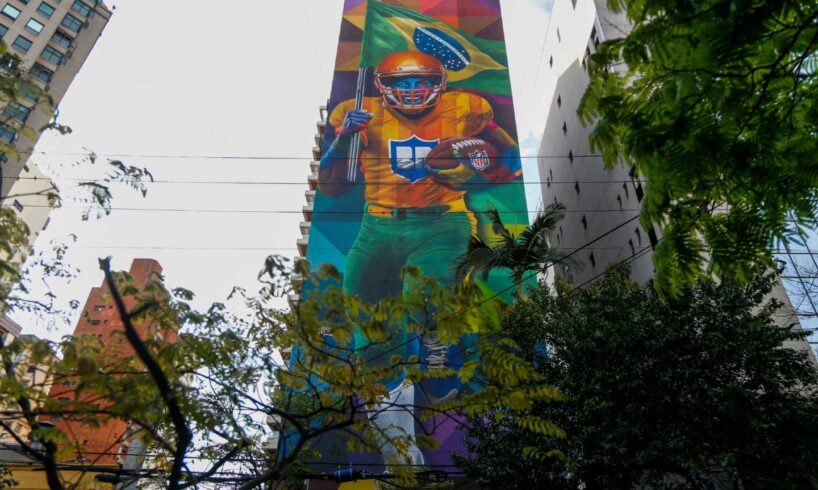
October 15, 2025
An industry built on addiction and loss now commands enormous political and cultural influence, from NFL stadiums in Philadelphia to soccer stadiums in São Paulo.
Ad Policy
A mural, by the artist Eduardo Kobra, drawn on a building in a favela in Sao Paulo, Brazil, ahead of the NFL Game between the Los Angeles Chargers and Kansas City Chiefs on September 4, 2025. (Miguel Schincariol / Getty Images)
On September 4, 2025, the NFL season kicked off at Lincoln Financial Field, where the Eagles defeated the Dallas Cowboys. But there was another clear winner at the NFL’s opening game: online sports betting companies, which handled over $26.7 billion of bets from last year’s football season and which are projected to receive over $30 billion of NFL bets in the current one.
Their growth has expanded beyond traditional sports booking to the point where gambling companies now shape the fan experience and city infrastructures. At the Eagles’ opener, FanDuel paid to restore SEPTA’s Sports Express service, moving thousands of fans to and from the game as part of its branded partnership.
Just 24 hours later, their dominance was visible once again, not in the United States but in São Paulo, Brazil, where the Chiefs faced the Chargers in the second regular-season NFL game ever held in the country.
While the NFL framed the matchup as part of its ongoing international expansion, so too did online gambling companies, who viewed it as an opportunity to open one of the world’s fastest-growing betting markets. Brazil’s sportsbooks poured resources into promoting the matchup, and EstrelaBet, Brazil’s leading betting operator, reported a 217 percent surge in NFL wagers tied to the event, calling it proof of the country’s potential as a profit center.
In Brazil, online gambling now generates billions of reals every month—surpassing the revenue of the national banking sector. By the end of 2025, the Brazilian online gambling market is expected to reach BRL 31 billion in gross gaming revenue, rising further to BRL 64 billion by 2030.
Sports betting is the segment of the gambling market driving most of that growth; even though it was only legalized and regulated last year, Brazil now has the third-largest market for online gambling behind the United States and the United Kingdom.
Current Issue
The dominance of the gambling industry is on display at soccer games across the country, where players sponsored by companies like Bet365 and Pixbet face off against each other in stadiums sponsored by Superbet and Betano. That oversaturation of gambling advertisements—or propaganda, as it is more accurately called in Portuguese—has created a highly addictive ecosystem.
The key ingredient in the success of Brazil’s gambling propaganda machine has been its influencers, who lent the nascent sector of often mysteriously bankrolled and foreign incorporated gambling companies visibility and legitimacy. On TikTok, influencers actively market gambling as a credible vehicle for achieving their own luxurious lifestyles. In posts and stories, those influencers spread the same simple message: Quick and easy wins—just follow my link in the replies below.
The type of gambling influencers promote is often not even sports betting but slot-like fixed-odds “games” like Fortune Tiger—universally known as Jogo Tigrinho. Designed like a kid’s game from the app store, Tigrinho is notorious for hooking users with small wins before draining their balances. “The algorithm first fascinates you, then imprisons you, and then takes everything away from you,” said one user, who lost R$1.9 million through online bets and had to sell her car to pay off her creditors.
Many influencers post promotional videos of themselves winning on the app, but investigations have shown that those videos are often deceptive—that influencers use fake demo versions of the games programmed to deliver constant jackpots, designed to create the illusion that their followers can easily replicate their success with low risk.
Contracts obtained by Revista Piauí (a magazine based in the Brazilian state of Piauí) revealed a disturbing incentive structure behind these sponsorships. Influencers are not paid for the number of clicks they produce—the standard promotional arrangement—but by the net betting losses of their followers. Within the gambling industry, that arrangement is known as the cachê da desgraça alheia, or “fee of others’ misfortune.”
A controversy involving Virginia Fonseca—Brazil’s ninth-most-popular influencer on Instagram, with more than 50 million followers—reportedly receiving 30 percent of her followers’ gambling losses under a cachê da desgraça alheia scheme made national headlines and led to a congressional inquiry into the industry and its influence.
Ad Policy
Popular
“swipe left below to view more authors”Swipe →
On social media, Fonseca can be seen encouraging her millions of followers to play Tigrinho “a lot” so they can “master it, learn the tips,” and win prizes as large as R$24,000 just like her. And although she denied any participation in a cachê da desgraça alheia scheme during her Senate testimony, Revista Piauí’s investigative contract exposure suggests otherwise.
The Fonseca case, though revealing, only exposes one element of the gambling industry’s behemoth propaganda apparatus. International soccer megastar Neymar fronts the gambling company Blaze, a business recently placed under investigation by the São Paolo police over its alleged failure to pay out the highest prizes on its site. Neymar’s contract with Blaze is estimated to be worth $100 million, while his father recently collected R$4.5 million for brokering the company’s partnership with Santos FC. Galvão Bueno—the Brazilian Al Michaels—has served as a spokesman for Pixbet. Vinícius Júnior lends his image to Betnacional.
Together, this propaganda—promoting a lifestyle of glamour on one side and capturing football fanfare on the other—gives gambling companies access to nearly every audience, with measurable effects on the most vulnerable people, including young men, who make up about 62 percent of Brazil’s online gamblers.
A 2025 Aos Fatos (“To the Facts”) investigation found that 30 percent of gambling ads promised easy or extraordinary winnings, and 60 percent of those appeared even after such claims had been outlawed by the Ministry of Finance. Findings from Favela Diz Research Institute show the alarming levels of influence these campaigns have on human behavior: 55 percent of favela residents say they are influenced by celebrity endorsements, 58 percent that they are more likely to use platforms promoted by celebrities, and nearly two-thirds admit they have bet because of the advertising.
Those advertisements, which exploit the dire straits of favela residents by promising them a way to “get rich” and make “easy gains,” have been remarkably successful for the industry—and devastating for the poor. In 2024, the consultant group Strategy& estimated that online gambling absorbed 1.38 percent of household budgets of families in classes D and E, Brazil’s poorest social categories. The same year, the National Trade Confederation sounded the alarm that “online casinos ha[d] put 1.3 million Brazilians into default, removing BRL 1.1 billion from national retail consumption” in the process.
That is because money spent on gambling in a country where the average monthly salary is $600 is not typically disposable income. Gambling losses in Brazil reflect rent money, grocery money, and increasingly, welfare or Bolsa Familia money siphoned into gambling apps often incorporated in Curaçao or Cyprus that are designed to addict.
“It’s logical that I’ve lost more than I’ve won… I have no idea how much exactly” said Mateus, a 30-year-old resident of Rio de Janeiro who belongs to a fan club of the soccer team Flamengo and frequently bets on their games. “I know some people who don’t have control and have lost a lot of money. I don’t know anyone who has won a lot of money.”
A report from the Central Bank of Brazil last September found that 5 million Brazilians transferred $3 billion of Bolsa Familia funds—20 percent of the government program’s monthly budget—to gambling companies on Brazil’s cash transfer service, “Pix.” Consequently, Brazil’s Supreme Court, the STF, outlawed online gambling companies from hosting any individual on their platforms who receives that form of government assistance.
But despite attempts to rein in the siphoning of government funds away from their public benefit purpose into the bank accounts of a new gambling elite, Bolsa Familia money continues to find its way onto the online betting tables. As SBC News reported in April, an attempt to block Bolsa Família cards failed—most disbursements arrive via bank transfers, not traceable prepaid cards—allowing the siphoning of welfare payments to continue often with few obstacles.
Since Lula legalized online gambling through Law No. 14,790 (2023), Brazil’s Congress has remained divided over how to regulate it. The Chamber of Deputies approved a bill covering licensing, taxation, and advertising, but the Senate’s vote has been repeatedly delayed. Even as debates drag on, some licensing rules are already in effect; as of January 1, 2025, only operators incorporated in Brazil and holding at least 20 percent Brazilian ownership can legally accept bets, provided they have paid a R$30 million licensing fee.
On one side of the debate is Brazil’s gambling lobby or “betting caucus,” led by politicians like Adolfo Viana, from the neoliberal, center-right party PSDB, which generally tends to represent the interests of Brazil’s financial elite. Viana and his colleagues in the caucus legislated to reduce the contribution betting companies must pay to Social Security from 10 percent down to 2 percent. Though Viana comes from the center-right, Brazil’s gambling lobby is not exclusively conservative; rather, it contains a diverse consortium of ideologies, illustrated by one of gambling’s biggest defenders, Joao Carlos Bacelar Batista, a left/liberal member of the Green Party from the state of Bahia who has worked to expand the range of “e-sports” certified and permitted by the government.
On the other side of the debate in Brasilia is a growing opposition coalition led by President Lula and the Supreme Federal Court (STF), which has framed online gambling as a public health and economic emergency. Lula has repeatedly warned that if regulation fails to stop the siphoning of welfare money into gambling apps, his government will move to ban the industry altogether.
That stance has earned unexpected support from Brazil’s powerful evangelical bloc, which, grounded in their moral religious opposition to betting, has seized on the current crisis as proof of spiritual and social decay. Heavy resistance from evangelical lawmakers forced the Brazilian Senate to postpone a scheduled vote in July on legalizing casinos and other forms of land-based gambling.
The fight over online gambling in Brazil illustrates a broader struggle around the world; an industry built on addiction and loss now commands enormous political and cultural influence, from NFL stadiums in Philadelphia to soccer stadiums in São Paulo. As multinational gambling corporations and influencers reap vast fortunes, the costs are borne most by those least able to afford them. Whether Lula’s government and the STF can successfully take on Brazil’s gambling leviathan—or whether the country becomes a casino in all but name—remains an open question.
Harrison Berger
Harrison Berger is an independent journalist who contributes for Drop Site News and Neutrality Studies on YouTube. Previously, he was a researcher and producer for System Update with Glenn Greenwald. His work focuses on civil liberties and U.S. foreign policy. He holds a BA in Political Science and Russian Studies from Union College (NY).
More from The Nation
Amid a spiraling political crisis, France’s president is being forced to retreat on his signature reform.
Harrison Stetler
Palestinans are expected to accept the same deal that led to October 7: permanent subjugation under the guise of “prosperity.”
Spencer Ackerman
Machado’s record makes a mockery of the idea she is a committed champion of peace, promoter of democracy, or unifying figure.
Gabriel Hetland
A conversation with Robert Malley about Israel’s actions in Gaza and the West Bank, why the US failed to bring peace to the region, and his recent book Tomorrow Is Yesterday.
Q&A
/
Ahmed Moor
The president’s unprecedented and lawless attacks supposedly target drug cartels, but serve a far more troubling political agenda.
Greg Grandin
The fight for true Palestinian liberation is far from over.
Jack Mirkinson





